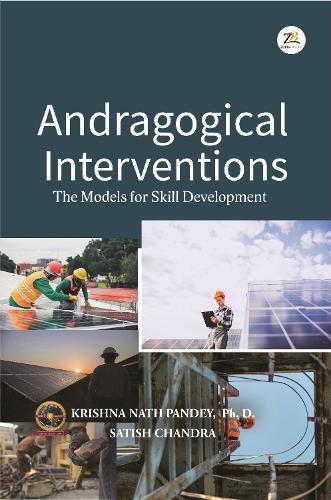Readings Newsletter
Become a Readings Member to make your shopping experience even easier.
Sign in or sign up for free!
You’re not far away from qualifying for FREE standard shipping within Australia
You’ve qualified for FREE standard shipping within Australia
The cart is loading…






This title is printed to order. This book may have been self-published. If so, we cannot guarantee the quality of the content. In the main most books will have gone through the editing process however some may not. We therefore suggest that you be aware of this before ordering this book. If in doubt check either the author or publisher’s details as we are unable to accept any returns unless they are faulty. Please contact us if you have any questions.
Andragogical Interventions Higher Education in India Chapter 1 Introduction 1.1 Statement of the Problem 1.2 Research Objectives 1.3 Research Gaps 1.4 Research Questions 1.5 Scope of the Study 1.6 Significance of the Study 1.7 Organization of the Research Chapter 2 Context 2.1 Key Concepts of Flipped Learning Pedagogy and Its Evolvement 2.1.1 Historical Background 2.1.2 The Concept of Flipped Learning 2.1.3 Misconceptions about Flipped Learning 2.2 Theoretical Frameworks 2.3 Rising Interest in Flipped Learning Pedagogy 2.3.1 Research Studies on the Effects of Flipped Learning 2.3.2 Motivations to Apply Flipped Learning in Higher Education 2.3.3 Challenges and Barriers Faced in Flipped Learning 2.5 Pedagogical Framework and Course Design for Flipped Learning 2.6 Factors Impacting the Adoption of the Flipped Classroom 2.7 Strategies for Successful Implementation of Flipped Learning 2.8 Flipped Learning Use in Higher Education in India - Current Status and Challenges 2.9 Conceptual Framework of Flipped Learning in the Indian Context Chapter 3 Research Methodology 3.1 Research Design 3.1.1 Study Area 3.1.2 Data Sources 3.1.3 Rapid Appraisal Methodology 3.1.4 Questionnaire Survey 3.2 Unit of Analysis 3.3 Data Collection and Tools 3.3.1 Case Study of JIS College of Engineering, Kalyani, India 3.3.2 Interviews with Key Informants 3.3.3 Focus Group Discussion. 3.3.4 Questionnaire Survey, Sample Size, and Reliability Chapter 4 Findings and Analysis 4.1 Application of Flipped Learning Pedagogy in Higher Education in India 4.1.1 Findings and Observations from a Visit to a College in India . 4.1.2 Findings from the Interviews 4.1.3 Findings from the Focus Group Discussion 4.2 Key Drivers for the Adoption of Flipped Learning 4.2.1 Findings and Descriptive Analysis 4.2.1.1 Breakdown of Respondents 4.2.1.2 Awareness of Flipped Learning 4.2.1.3 Experience with Flipping a Course 4.2.1.4 Educator Perspective on Students in Flipped Learning 4.2.1.5 Institutional Support 4.2.1.6 Challenges to Flip Courses 4.2.1.7 The Indian Context 4.2.2 Factor Analysis 4.3 Challenges Faced in Adoption of Flipped Learning in Higher Education in India 4.3.1 Total Interpretative Structural Modeling 4.3.1.1 Methodology for Challenges Identification and Validation 4.3.2 TISM Methodology and Model Development 4.4 Framework for Effective Implementation of Flipped Learning in Higher Education in India Chapter 5 Conclusion 5.1 Findings and Recommendations 5.2 Conclusion 5.3 Policy Recommendations and Actions for Indian Higher Education Institutes 5.4 Future Research
$9.00 standard shipping within Australia
FREE standard shipping within Australia for orders over $100.00
Express & International shipping calculated at checkout
This title is printed to order. This book may have been self-published. If so, we cannot guarantee the quality of the content. In the main most books will have gone through the editing process however some may not. We therefore suggest that you be aware of this before ordering this book. If in doubt check either the author or publisher’s details as we are unable to accept any returns unless they are faulty. Please contact us if you have any questions.
Andragogical Interventions Higher Education in India Chapter 1 Introduction 1.1 Statement of the Problem 1.2 Research Objectives 1.3 Research Gaps 1.4 Research Questions 1.5 Scope of the Study 1.6 Significance of the Study 1.7 Organization of the Research Chapter 2 Context 2.1 Key Concepts of Flipped Learning Pedagogy and Its Evolvement 2.1.1 Historical Background 2.1.2 The Concept of Flipped Learning 2.1.3 Misconceptions about Flipped Learning 2.2 Theoretical Frameworks 2.3 Rising Interest in Flipped Learning Pedagogy 2.3.1 Research Studies on the Effects of Flipped Learning 2.3.2 Motivations to Apply Flipped Learning in Higher Education 2.3.3 Challenges and Barriers Faced in Flipped Learning 2.5 Pedagogical Framework and Course Design for Flipped Learning 2.6 Factors Impacting the Adoption of the Flipped Classroom 2.7 Strategies for Successful Implementation of Flipped Learning 2.8 Flipped Learning Use in Higher Education in India - Current Status and Challenges 2.9 Conceptual Framework of Flipped Learning in the Indian Context Chapter 3 Research Methodology 3.1 Research Design 3.1.1 Study Area 3.1.2 Data Sources 3.1.3 Rapid Appraisal Methodology 3.1.4 Questionnaire Survey 3.2 Unit of Analysis 3.3 Data Collection and Tools 3.3.1 Case Study of JIS College of Engineering, Kalyani, India 3.3.2 Interviews with Key Informants 3.3.3 Focus Group Discussion. 3.3.4 Questionnaire Survey, Sample Size, and Reliability Chapter 4 Findings and Analysis 4.1 Application of Flipped Learning Pedagogy in Higher Education in India 4.1.1 Findings and Observations from a Visit to a College in India . 4.1.2 Findings from the Interviews 4.1.3 Findings from the Focus Group Discussion 4.2 Key Drivers for the Adoption of Flipped Learning 4.2.1 Findings and Descriptive Analysis 4.2.1.1 Breakdown of Respondents 4.2.1.2 Awareness of Flipped Learning 4.2.1.3 Experience with Flipping a Course 4.2.1.4 Educator Perspective on Students in Flipped Learning 4.2.1.5 Institutional Support 4.2.1.6 Challenges to Flip Courses 4.2.1.7 The Indian Context 4.2.2 Factor Analysis 4.3 Challenges Faced in Adoption of Flipped Learning in Higher Education in India 4.3.1 Total Interpretative Structural Modeling 4.3.1.1 Methodology for Challenges Identification and Validation 4.3.2 TISM Methodology and Model Development 4.4 Framework for Effective Implementation of Flipped Learning in Higher Education in India Chapter 5 Conclusion 5.1 Findings and Recommendations 5.2 Conclusion 5.3 Policy Recommendations and Actions for Indian Higher Education Institutes 5.4 Future Research